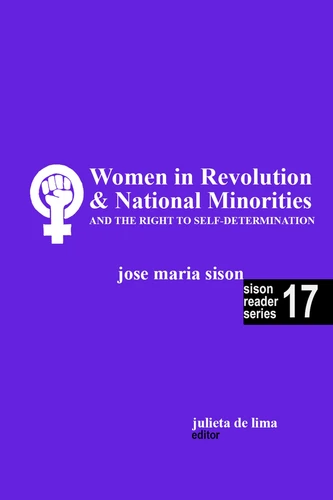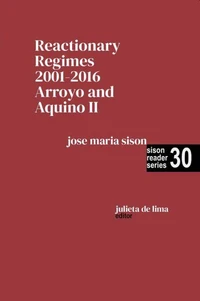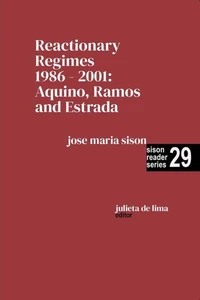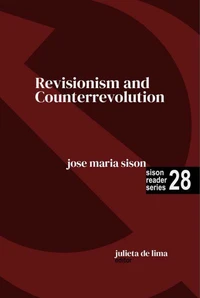Women in Revolution & National Minorities and the Right to Self - Determination. Sison Reader Series, #17
Par : ,Formats :
Disponible dans votre compte client Decitre ou Furet du Nord dès validation de votre commande. Le format ePub est :
- Compatible avec une lecture sur My Vivlio (smartphone, tablette, ordinateur)
- Compatible avec une lecture sur liseuses Vivlio
- Pour les liseuses autres que Vivlio, vous devez utiliser le logiciel Adobe Digital Edition. Non compatible avec la lecture sur les liseuses Kindle, Remarkable et Sony
 , qui est-ce ?
, qui est-ce ?Notre partenaire de plateforme de lecture numérique où vous retrouverez l'ensemble de vos ebooks gratuitement
Pour en savoir plus sur nos ebooks, consultez notre aide en ligne ici
- FormatePub
- ISBN8223517788
- EAN9798223517788
- Date de parution12/10/2023
- Protection num.pas de protection
- Infos supplémentairesepub
- ÉditeurDraft2Digital
Résumé
Women all over the world are driven by their dire situation to unite and fight for their rights. From year to year, as the global crisis worsens, the women's movement has raised its level of resolve and militancy and widened its various arenas of action. Women are fighting not only for their very existence but also for the lives of their children and grandchildren. Outraged, they vigorously expose, condemn and oppose the doublespeak of their own governments, which try to equate neoliberal policies to development. The nationality question can be dealt with only in historical terms.
It involves correctly relating the political, socioeconomic and cultural aspects of nationality as well as the whole national formation, its parts and the world. In its origination and development, Philippine or Filipino nationality is first of all a political concept that has arisen and developed from the necessity of uniting and activating the entire people of various social conditions and cultural traits in the anticolonial and then the anti-imperialist struggles for national independence and democracy. To this day, the Marxist-Leninist teachings on the nationality question are our best guide.
There is yet no experience more advanced than that of Lenin, Stalin and Mao in successfully dealing with the nationality question in the course of overthrowing the counterrevolutionary state and establishing and building socialism.
It involves correctly relating the political, socioeconomic and cultural aspects of nationality as well as the whole national formation, its parts and the world. In its origination and development, Philippine or Filipino nationality is first of all a political concept that has arisen and developed from the necessity of uniting and activating the entire people of various social conditions and cultural traits in the anticolonial and then the anti-imperialist struggles for national independence and democracy. To this day, the Marxist-Leninist teachings on the nationality question are our best guide.
There is yet no experience more advanced than that of Lenin, Stalin and Mao in successfully dealing with the nationality question in the course of overthrowing the counterrevolutionary state and establishing and building socialism.
Women all over the world are driven by their dire situation to unite and fight for their rights. From year to year, as the global crisis worsens, the women's movement has raised its level of resolve and militancy and widened its various arenas of action. Women are fighting not only for their very existence but also for the lives of their children and grandchildren. Outraged, they vigorously expose, condemn and oppose the doublespeak of their own governments, which try to equate neoliberal policies to development. The nationality question can be dealt with only in historical terms.
It involves correctly relating the political, socioeconomic and cultural aspects of nationality as well as the whole national formation, its parts and the world. In its origination and development, Philippine or Filipino nationality is first of all a political concept that has arisen and developed from the necessity of uniting and activating the entire people of various social conditions and cultural traits in the anticolonial and then the anti-imperialist struggles for national independence and democracy. To this day, the Marxist-Leninist teachings on the nationality question are our best guide.
There is yet no experience more advanced than that of Lenin, Stalin and Mao in successfully dealing with the nationality question in the course of overthrowing the counterrevolutionary state and establishing and building socialism.
It involves correctly relating the political, socioeconomic and cultural aspects of nationality as well as the whole national formation, its parts and the world. In its origination and development, Philippine or Filipino nationality is first of all a political concept that has arisen and developed from the necessity of uniting and activating the entire people of various social conditions and cultural traits in the anticolonial and then the anti-imperialist struggles for national independence and democracy. To this day, the Marxist-Leninist teachings on the nationality question are our best guide.
There is yet no experience more advanced than that of Lenin, Stalin and Mao in successfully dealing with the nationality question in the course of overthrowing the counterrevolutionary state and establishing and building socialism.






















